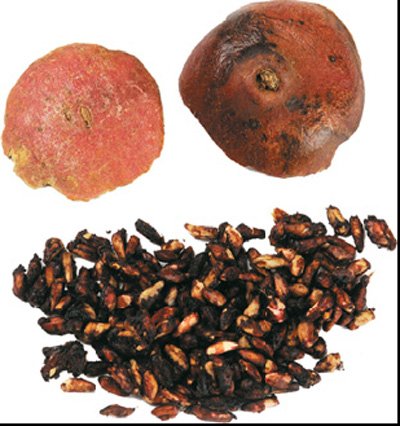Pomegranate
Ayurvedic Medicine

Pomegranate
Pomegranate (E), Anar (fruit) (H), Anardana (seeds) (H):
This beautiful red fruit is famed for its taste as well as being a fertility symbol. It specifically balances an acidic digestion, nourishes the heart and balances levels of oestrogen.
Digestion The sweet juice of the fruit is a wonderful cooling drink for soothing an inflamed stomach and intestines. It is a specific for hyperacidity and the resulting nausea. Its mild astringency helps to slow the movement of vata and alleviates any excess pitta. The rind is a fine astringent that will bind a loose bowel very quickly. It is a common folk remedy for dysentery with bleeding and mucus. It also kills parasites; it is a specific for tapeworms, pinworms and roundworms. The dry, roasted seeds are a great benefit to those with an excessive appetite, tiksnagni, as they help to balance the excess pitta (Lad 1998). Heart As a wonderful cordial herb it strengthens the heart. Its affinity for the blood helps to nourish rakta dhatu. Its sweet and astringent qualities are beneficial in bleeding anywhere in the circulatory system. Reproduction Pomegranates are a well-known aphrodisiac. They benefit the semen (s´ukrala) via the plasma or rasa dhatu. The decoction of the rind can be used as a douche in leucorrhoea. There is recent interest in using pomegranates to treat prostate problems including BPH and prostatic cancer. Menopause Pomegranates are useful for maintaining healthy levels of oestrogen as they contain small amounts of estrone. Eat the fresh fruit, juice or seeds regularly during menopause. The sweet flavour can help to cool sensations of burning and flushing. Nerves The beneficial effect of the fruit on majja dhatu helps to nourish the brain and nervous system.
 Pit Shirisha
Pit Shirisha Nutmeg
Nutmeg Dhattura
Dhattura Guduchi
Guduchi Tila
Tila Vidari
Vidari Damanaka
Damanaka Kushtha
Kushtha Haritaki
Haritaki Ashoka
Ashoka Lotus
Lotus Lemon And Lime
Lemon And Lime Test your English Language
Test your English Language  Car Maintenance
Car Maintenance Benefits of Elderberry
Benefits of Elderberry Weird Insects
Weird Insects SuperFood
SuperFood Best Cities for young People
Best Cities for young People Best Cricketer
Best Cricketer




